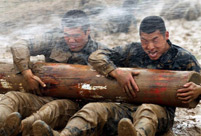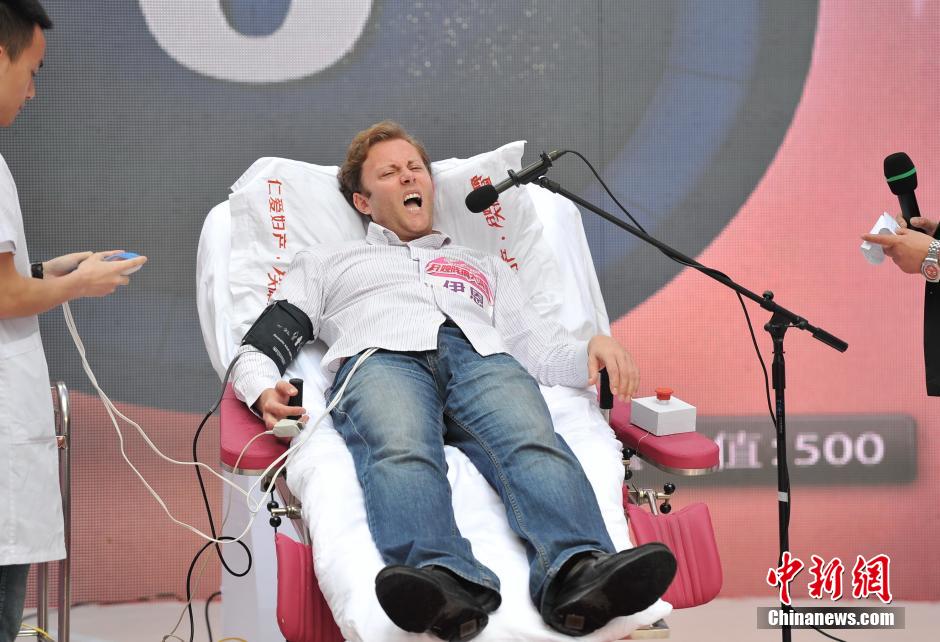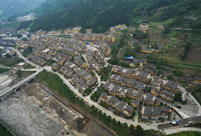 First overseas "China-standard" electric railway laid
First overseas "China-standard" electric railway laid
 College graduate launches organic agricultural cooperative in hometown
College graduate launches organic agricultural cooperative in hometown Guizhou Earthquake Emergency Rescue Team takes part in emergency exercises
Guizhou Earthquake Emergency Rescue Team takes part in emergency exercises Giant Spider-Man appears in Fuzhou
Giant Spider-Man appears in Fuzhou
 Beautiful Chinese-built roads in Africa
Beautiful Chinese-built roads in Africa Sagya Monastery in Tibet
Sagya Monastery in Tibet
 Young Chinese drive consumption
Young Chinese drive consumption
 The life of a model: Not as glamorous as it seems
The life of a model: Not as glamorous as it seems
 Hello Kitty, happy 40th birthday!
Hello Kitty, happy 40th birthday!
 The Western Qing Mausoleum
The Western Qing Mausoleum
HAIKOU, May 20 -- More than 3500 Chinese workers evacuated from Vietnam arrived in Haikou, capital of Hainan Province on Tuesday after around 20 hours aboard four ships.
After violent anti-China protests in Vietnam, the Chinese government sent the ships to bring home workers from a number of Chinese enterprises, including Metallurgical Corporation of China (MCC) and China Energy Group. The first group of 989 workers aboard Wuzhishan arrived at Haikou's Xiuying Port at around 9 a.m.
"Finally, we are home. Now I feel safe again," said Ma Changmin, who has been a construction worker in Vietnam for the past six years.
The chartered ships were part of an greater evacuation operation. Some 135 Chinese working in Ha Tinh Province were flown home on Sunday.
Protests against foreign companies in central and southern Vietnamese provinces turned violent last week. The MCC said Tuesday in a statement on its website that four of its workers were killed in the attacks, and more than 120 others were injured, including 23 in severe condition.
Anti-China looting and arson came after Vietnamese ships and personnel repeatedly harassed the normal operations of a Chinese oil company in waters only 17 nautical miles from China's Zhongjian Island, part of Xisha Islands, in the South China Sea.
RIOTOUS ASSEMBLY
Returning home, Chinese workers are still frightened by last week's nightmare.
"We were trapped in our company lodgings when the riot started. Hundreds of rioters were throwing steel, bricks and even fire bombs at our building," said Fan Songyong, an engineer.
"We collected some steel bars and fire extinguisher for protection, and barred the windows and doors to keep the rioters out," Fan said. "In such a state, we passed four sleepless days and nights."
Ma Changmin was working on an open construction site when around 400 rioters appeared and began to throw stones at Ma and his workmates. "We returned to our project building. They chased us inside, and we had to lock the door and call the police. They were just about to break down the doors when the riot squad arrived," Ma said, adding that a dozen of his workmates were hurt during the clash.
Gao Yongbing said it was the worst time of his life. "We managed to repel the rioters three times, but they returned with even more brutal attacks. We had no way to get away but had to huddle together to let them beat us. One of us had his fingers cut off... We slept in the sand at night so that the mob wouldn't find us."
ORGANIZED LOOTING
"Our personal belongs - computers, luggage, rings and clothes - in the company housing, have all been taken," said He Yulong, whose rooms were looted.
"Many of my workmates have lost everything and boarded the evacuation ships with nothing," He said, adding that their office building, toolhouse and warehouse had all been burnt.
Fan said the looting on May 14 was well planned and organized. "Nearly 1,000 rioters were divided into four groups. The first group rode motorcycles to find where we were. The second group was the smashing team and the third was looting team. The last group set fire to the site."
Economic losses are expected to be huge. There are hundreds of Chinese enterprises in Ha Tinh, and most have been affected by the riot.
Among the Chinese workers evacuated, many are from MCC, a contractor of an iron and steel complex owned by the Formosa Plastics Group of Taiwan. The Ha Tinh project, with a planned investment of 23 billion U.S. dollars, was expected to be Southeast Asia's largest steel-making facility when completed in 2017.
Yan Guoliang, a senior manager of MCC, said construction could only be resumed when the security problem has been solved and compensation has been made.
"Local cops came to the site to check on the situation, but some of them turned a blind eye to the riot at the start," Yan said.
Besides Chinese companies, a large number of South Korean, Japanese and Singaporean plants also fell prey to mobs and their factories were forced to shut down.
China, holding sufficient economic leverage over Hanoi to protect its interests, has so far exercised maximum restraint, but Chinese tourists are canceling trips to Vietnam.
PAINS TO BE HEALED
The attacks have not only disrupted the operations of Chinese companies, but have cast a shadow over investors and workers, who now have second thoughts about doing business in Vietnam.
"Although there are now military forces around the industrial park to protect the workers, I and most of my colleagues don't want to work there again," Fan said, adding that a salary double domestic levels is not so so attractive after the riot.
An injured worker surnamed Wei didn't want to think back to the night of the attacks. "I only want to go home," he said.
"Many Chinese workers were in great panic after the riot, especially the people who had engaged the mob or witnessed the bloody scene. They need counseling," Yan said.
One worker still held a steel tube in his sleep even on the evacuation ship, Yan said.
Chinese Assistant Foreign Minister Liu Jianchao said that ensuring the safety of its nationals is China's top priority. A trans-agency working group set up to deal with the aftermath of the violence will prolong its stay in Vietnam.
 A bite of Jiang Nan
A bite of Jiang Nan PLA's tough exercises
PLA's tough exercises Best photos of the week
Best photos of the week  When we are young...
When we are young... Wedding photos of world champion
Wedding photos of world champion "The Most Beautiful Chinese Land"
"The Most Beautiful Chinese Land"  Men experience pains of childbirth on Mother's Day
Men experience pains of childbirth on Mother's Day  J-11 fighters training in complex meteorological conditions
J-11 fighters training in complex meteorological conditions Six years after Wenchuan earthquake
Six years after Wenchuan earthquake  8 great movies to watch with your mom
8 great movies to watch with your mom China's most luminous celebrities
China's most luminous celebrities Newly recruited police in Hetian hold drill
Newly recruited police in Hetian hold drill  Bird-men compete flying in Hong Kong
Bird-men compete flying in Hong Kong  The 'Chinese Dad'
The 'Chinese Dad' Shanghai locals bid farewell to childhood memories
Shanghai locals bid farewell to childhood memoriesDay|Week|Month